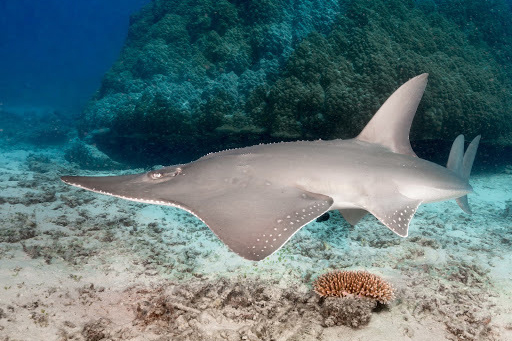Whitespotted Guitarfish, Rhynchobatus australiae Whitley 1939
Other Names: Fiddler, Giant Guitarfish, Sandshark, Shovelnose Shark, Whitespot Ray, Whitespot Shovelnose Ray, White-spotted Guitarfish, White-spotted Shovelnose Ray, White-spotted Shovelnosed Guitarfish, White-spotted Shovelnosed Ray, White-spotted Shovelnose-ray, Whitespotted Wedgefish, White-spotted Wedgefish

A Whitespotted Guitarfish, Rhynchobatus australiae, at Lady Elliot Island, southern Great Barrier Reef, Queensland, October 2014. Source: David R / iNaturalist.org. License: CC by Attribution-NonCommercial-NoDerivatives
Summary:
In the past, this species has been referred to as Rhynchobatus djiddensis, which occurs in the Western Indian Ocean from the Eastern Cape Province, South Africa, to the Red Sea. The Whitespotted Guitarfish is also confused with the Smoothnose Wedgefish, Rhynchobatus laevis, which also occurs in Australia.
Cite this page as:
Bray, D.J. 2017, Rhynchobatus australiae in Fishes of Australia, accessed 20 Apr 2024, https://fishesofaustralia.net.au/home/species/3273
Whitespotted Guitarfish, Rhynchobatus australiae Whitley 1939
More Info
|
Distribution |
Fremantle, Western Australia, around the tropical north to the mouth of the Manning River, New South Wales, and possibly south to Sydney. Elsewhere, the species occurs in the tropical, east-Indo-west Pacific. Inhabits inshore waters, occurring on soft bottoms near reefs. |
|
Feeding |
Reportedly feeds on invertebrates such as crabs, other crustaceans and shellfish. |
|
Biology |
Little is known of the biology of this species. The species is aplacental viviparous (ovoviparous), with embryos feeding initially on egg yolk, then receiving additional nourishment from the mother by indirect absorption of uterine fluid enriched with mucus, fat or protein through specialised structures (Dulvy & Reynolds 1997). |
|
Fisheries |
Rhynchobatus australiae is taken in multiple artisanal and commercial fisheries throughout its range both as a target species and as bycatch. The flesh is sold for human consumption in Asia and the fins from large animals fetch exceptionally high prices, creating a significant incentive for bycatch to be retained. Although not targeted in Australia, the species is taken as bycatch in demersal trawl fisheries. However, in a number of fisheries in Australia, catch rates may have declined due to the introduction to turtle exclusion devices (TEDS) (White & McAuley 2003). |
|
Remarks |
Rhynchobatus australiae has been confused with R. djiddensis (a species found only in the western Indian Ocean and Red Sea), and R. laevis which has recently been described from Australian waters. |
|
Species Citation |
Rhynchobatus djiddensis australiae Whitley 1939, Aust. Zool. 9(3): 245, fig. 14. Type locality: off the Manning River mouth, NSW. |
|
Author |
Bray, D.J. 2017 |
|
Resources |
Whitespotted Guitarfish, Rhynchobatus australiae Whitley 1939
References
Allen, G.R. 1997. Marine Fishes of Tropical Australia and South-east Asia. Perth : Western Australian Museum 292 pp. 106 pls. (as Rhynchobatus djiddensis)
Allen, G.R. & Erdmann, M.V. 2012. Reef fishes of the East Indies. Perth : Tropical Reef Research 3 vols, 1260 pp.
Compagno, L.J.V. & Last, P.R. 1999. Families Pristidae, Rhinidae, Rhinobatidae, Platyrhinidae. pp. 1410-1432 in Carpenter, K.E. & Niem, V.H. (eds) The Living Marine Resources of the Western Central Pacific. FAO Species Identification Guide for Fisheries Purposes. Rome : FAO Vol. 3 pp. 1397-2068.
Dulvy, N.K. & Reynolds, J.D. 1997. Evolutionary transitions among egg-laying, live-bearing and maternal inputs in sharks and rays. Proc. R. Soc. Lond., Ser. B: Biol. Sci. 264: 1309-1315.
Giles, J.L., Riginos, C., Naylor, G.J.P., Dharmadi & Ovenden, J.R. 2016. Genetic and phenotypic diversity in the wedgefish Rhynchobatus australiae, a threatened ray of high value in the shark fin trade. Marine Ecology Progress Series 548: 165–180, doi: 10.3354/meps11617
Grant, E.M. 2002. Guide to Fishes. Redcliffe : EM Grant Pty Ltd 880 pp. (as Rhynchobatus djiddensis)
Kuiter, R.H. 1996. Guide to Sea Fishes of Australia. A comprehensive reference for divers and fishermen. Sydney, NSW, Australia : New Holland Publishers xvii, 434 pp. (as Rhynchobatus djiddensis)
Last, P.R., Séret, B. & Naylor, G.J.P. 2016. A new species of guitarfish, Rhinobatos borneensis sp. nov. with a redefinition of the family-level classification in the order Rhinopristiformes (Chondrichthyes: Batoidea). Zootaxa 4117(4): 451-475.
Last, P.R. & Stevens, J.D. 1994. Sharks and Rays of Australia. Canberra : CSIRO Australia 513 pp. 84 pls.
Last, P.R. & Stevens, J.D. 2009. Sharks and Rays of Australia. Collingwood : CSIRO Publishing Australia 2, 550 pp.
Last, P.R., White, W.T. & Séret, B. 2016. 9. Wedgefishes. Family Rhinidae. In: Last, P.R., White, W.T., Carvalho, M.R. de, Séret, B., Stehmann, M.F.W. & Naylor, G.J.P. (eds) Rays of the World. Clayton South, Victoria : CSIRO Publishing 790 pp.
Macbeth, W.G., Vandenberg, M. & Graham, K.J. 2008. Identifying Sharks and Rays; A guide to Commercial Fishers. Sydney : New South Wales Department of Primary Industry pp. 71.
Randall, J.E., Allen, G.R. & Steene, R. 1997. Fishes of the Great Barrier Reef and Coral Sea. Bathurst : Crawford House Press 557 pp. figs.
White, W.T., Last, P.R., Stevens, J.D., Yearsley, G.K., Fahmi & Dharmadi. 2006. Economically Important Sharks and Rays of Indonesia. Canberra : ACIAR Publishing, 329 pp.
White, W.T. & McAuley, R. (SSG Australia & Oceania Regional Workshop, March 2003). 2003. Rhynchobatus australiae. The IUCN Red List of Threatened Species 2003: e.T41853A10580429. http://dx.doi.org/10.2305/IUCN.UK.2003.RLTS.T41853A10580429.en. Downloaded on 30 March 2017.
Whitley, G.P. 1939. Taxonomic notes on sharks and rays. The Australian Zoologist 9(3): 227-262 figs 1-18 pls 20-22
Whitley, G.P. 1940. The Fishes of Australia. Part 1. The sharks, rays, devil-fish, and other primitive fishes of Australia and New Zealand. Sydney : Roy. Zool. Soc. N.S.W. 280 pp. 303 figs. (as Rhynchobatus djiddensis australiae)










